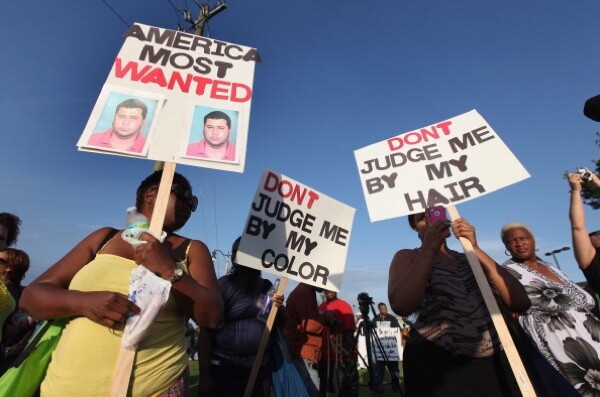Trayvon Martin is Rodney King All Over Again

As news of the month-old Trayvon Martin murder in Florida hit the national media this past week, I thought with no little astonishment: Didn't I write about this last week? Not literally, but figuratively in a big way. Too big. Last week I talked about being interviewed by a French television channel about the twenty-year anniversary of the L.A. riots and the issues at the time that ignited all the discontent: an unarmed black man being profiled and brutalized by law enforcement for all the world to see and hear, the tedious public argument about the rights of law enforcement and the potential (versus actual) criminality of Rodney King, the failure of a jury to convict the offending cops. We have been here before. In fact, we've never left.
King was older and luckier than 17-year-old Martin, who was killed. Not by cops, but by an overzealous neighborhood watch guy who saw himself as law enforcement proxy, with all the rights therein (including the right to "shoot to kill if feeling threatened," spelled out in a Florida state law that was championed by the NRA. This essentially makes everybody with a firearm a citizen-cop). I know the historical difficulty of prosecuting police for any use of force in the line of duty, but especially if that force is used on black men, which many people consider a legitimate part of the job of police everywhere -- L.A., Florida, and every town in between. Keeping us safe means keeping us safe from black men, a credo practically as old as the nation itself. But it's painful to witness the reluctance or inability of Florida officials to even arrest a regular joe who was acting not under color of official authority but on his own racial paranoia, which the police department in Sanford actually tried to discourage on the day of the murder.
Most discouraging to me and to many others is how cautious and circumspective everybody suddenly gets whenever black people are involved in a law-and-order incident like this. They are brutalized or killed, and the immediate response (after the initial outcry from black folks) is: Don't rush to judgment, let's wait and see, we don't know what really happened, etc. All of this has the appearance of fairness. But it's false face of progress; what it speaks to is our eternal reluctance to attribute any act to racism, because we've convinced ourselves for convenience's sake that racism is no longer a factor in anything. There is therefore no threshold for outrage or action in a case like Trayvon Martin's. We just talk it to death, talk it away, and feel like we've done something. We haven't; we just kind of hit a reset button. It's not hard to imagine that if, say, President Obama had been brutalized by a cop or a watch captain who perceived him as a threatening black man in an insular neighborhood, that we'd be having the same discussion about whether race was a factor. An unfortunate case of mistaken identity, we'd say. If the cop/captain had known it was the President...
But that's just the problem of racism -- we shouldn't have to "know" who the black man is to know how to respond. One of the questions the French journalists asked me last week was whether the riots could happen again. Of course, I replied. Not because South Central is inherently violent but because the underlying conditions that led to the violence are pretty much the same. But I was hardly thinking of just L.A.
Journalist and op-ed columnist Erin Aubry Kaplan's first-person accounts of politics and identity in Los Angeles, with an eye towards the city's African American community, appear every Thursday on KCET's SoCal Focus blog. Read all her posts here.


